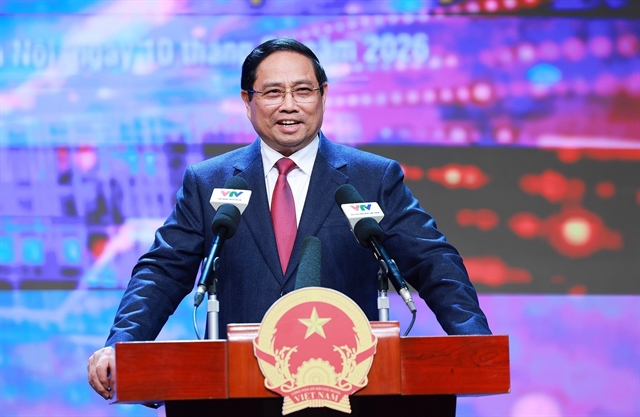 Society
Society

The National Assembly (NA) group discussion continued yesterday afternoon focusing on construction of some sections of the North-South expressway in the east during the 2017-2020 period.
 |
| The transport ministry should consider the possibility of cost overruns and prepare accordingly as it prepares to build a 654km section of the North-South expressway, NA deputies said yesterday. — Photo dantri.com.vn |
HÀ NỘI – The transport ministry should consider the possibility of cost overruns and prepare accordingly as it prepares to build a 654km section of the North-South expressway, NA deputies said yesterday.
Their comments came during discussions in the afternoon about the construction project that is to be implemented over a four-year (2017-2020) period. The construction will take place in the eastern part of the country.
Transport Minister Nguyễn Văn Thể said that the expressway project has a total investment of over VNĐ118.7 trillion (US$5.27 billion) for the 2017-2020 period, covering 654km of roads. It will have 11 sub-projects, three of which will get public investment of VNĐ55 trillion ($2.4 billion). Eight others will be Build-Operate-Transfer (BOT) projects.
After land clearance, private investors will be called on to invest in the project, he said.
The selection of private investors for the eight BOT projects will be through an open bidding process. The previous practice of appointing investors will no longer be applied, the minister said.
According to the Government proposal, BOT projects will collect toll for 24 years at average fee of VNĐ2,500 (11 US cents) per km. The current toll rate on the North-South expressway is VNĐ1,500 per km.
Thể said that the ministry has proposed rates for different periods of toll collection. When the BOT projects are completed, the initial toll fee will be VNĐ1,500 per km. It will be increased gradually to reach VNĐ3,400 per km two to three years later, so as to minimise public inconvenience.
Trần Hoàng Ngân, a deputy from HCM City, agreed on the necessity to construct some sections of the expressway, saying that it will contribute to overall infrastructure development, improving national competitiveness, meeting travel demand and boosting tourism.
The report submitted by the transport ministry is feasible, given budgetary constraints and high investment demands, he said.
However, he also proposed that the Government estimates and prepares for cost overruns as the project will be implemented over a large area for a long time.
The land clearance involving the resettlement of more than 8,000 households should also be open and transparent, he added.
Ngân also said that the estimated toll fees should be publicised early so that the public can give their feedback.
Furthermore, the transport ministry must report to the NA lessons learned from previous BOT projects so as to avoid failures in the North-South expressway project, he said.
Phạm Phú Quốc, another NA deputy from HCM City and general director of the State-owned Finance and Investment Company in HCM City, said that investment rate of VNĐ181.5 billion ($7.9 million) per km for the expressway project was low compared to other completed projects like the Hải Phòng-Hạ Long (VNĐ650 billion per km) and HCM City-Long Thành-Dầu Giây (VNĐ479 billion per km) roads.
“We must take into consideration the possibility of cost overrun. In case this happens, there needs to be additional funding sources,” he said.
“We must also avoid slowness in investment disbursement. Many public-invested projects have encountered this problem, leading to sluggish progress,” he said.
Quốc said that open bidding for the expressway project was a good idea, but the process should also eliminate incapable investors and select experienced, capable ones.
The National Assembly (NA) discussed the draft amended denunciations law yesterday morning, debating whether authorities should look into complaints against retired officials.
HCM City deputy Major General Ngô Tuấn Nghĩa, also the Political Commissar of HCM City High Command of the People’s Army, said that the handling of complaints against retired officials would be “very complicated”, and might be “taken advantage of to defame prominent ex-officials”.
“I think we should not have regulations regarding violations at work of retired officials in the denunciations law,” Nghĩa said.
Many public servants act correctly during their time in office, Nghĩa explained, but what they do might be deemed wrong at a later time.
“Receiving such denunciations will have a bad influence over the retired,” he added.
The NA Committee on Legal Affairs did not necessarily agree.
The committee head Nguyễn Khắc Định argued that anyone who notices a legal breach can make a denunciation to the State to stop such violation, fix the damages if there are any, and to handle the violators.
“Therefore, regardless of whether the denunciated is still in office or retired or in another line of work, the authorities with jurisdiction are responsible for receiving and addressing all complaints in line with the Law on Denunciations and other relevant laws,” Định said to the NA.
It was “suitable” to have a clear regulation on the jurisdiction to handle complaints against ex-public servants for their violations when they were still in office, he added.
Deputy Hoàng Thanh Tùng from Sóc Trăng Province agreed, saying that in principle, even ex-officials are subject to the law.
“The regulation also matches the general policy of the Party and the Government to handle any former officials if they are found breaching the law,” Tùng said.
Denunciation deadline
According to the draft amendments, the deadline for denunciating violations of organisations and individuals is five years from the day of wrongful acts and three years for breaches in State management work.
A majority of NA deputies argued against such fixed time limits, as several violations might never be reported and handled due to exceeding the deadlines.
The denunciations law should not regulate a denunciation deadline but use the already in place statute of limitations as a deadline for whatever the denounced is accused of, the NA said. — VNS




